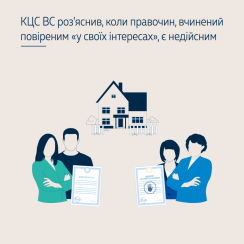 The plaintiffs’ father inherited the house from his mother (the plaintiffs’ grandmother), but he did not receive a certificate of the right to inheritance. As heirs, after the death of the plaintiff’s father, the plaintiff disputed the purchase and sale agreement, according to which their sister sold the disputed house to her husband shortly before the grandmother’s death on the basis of a power of attorney issued by her.
The plaintiffs’ father inherited the house from his mother (the plaintiffs’ grandmother), but he did not receive a certificate of the right to inheritance. As heirs, after the death of the plaintiff’s father, the plaintiff disputed the purchase and sale agreement, according to which their sister sold the disputed house to her husband shortly before the grandmother’s death on the basis of a power of attorney issued by her.
The first-instance court found the house purchase and sale contracts invalid, since they were concluded by the defendants not in the interests of the woman, but in the personal interests of the defendant, which falls under the provisions of Part 3 Art. 238 of the Central Committee of Ukraine.
The appellate court annulled the decision of the district court and refused to grant the claim, stating that the mere fact of concluding contracts between the principal’s representative and her husband does not prove that these transactions were concluded by the defendants in their personal interests. It is also taken into account that the principal did not contest the transactions, that is, she approved the facts of their conclusion by her representative.
The Supreme Court, as part of the panel of judges of the First Judicial Chamber of the Cassation Civil Court, annulled the decision of the Court of Appeal, upheld the decision of the court of first instance, making the following legal conclusions.
The contracts disputed by the plaintiffs, to which they were not parties, make it impossible for them to exercise their civil rights, namely the right to inherit property after the death of their father, that is, they are interested parties and have acquired the right to challenge the contracts (Part 3 of Article 215 of the Civil Code of Ukraine).
A power of attorney indicates the existence of a representative legal relationship between the person who issued it and the person to whom it is issued.
According to part 3 Art. 238 of the Civil Code of Ukraine, a representative cannot perform a transaction on behalf of the person he represents, in his own interests or in the interests of another person whose representative he is at the same time, with the exception of commercial representation, as well as in relation to other persons established by law.
At the same time, the phrase “in one’s own interests” should be understood in such a way that the representative cannot, on behalf of the person he/she represents, conduct transactions regarding himself/herself personally (that is, be a party to this transaction) or in another way to the detriment of the principal’s interests, including for the benefit of others persons, including those whose representative he is at the same time.
Therefore, if the representative committed the deed not in the interests of the principal, but in his own interests, then this is the basis for declaring such a deed invalid.
It is also necessary to take into account that Art. 60 of the Civil Code of Ukraine establishes the presumption of community property of spouses, in which the husband and wife’s parts are equal.
Contrary to the requirements of ch. 3 Art. 238 of the Civil Code of Ukraine, the defendant concluded the contested contracts on the basis of the woman’s power of attorney exclusively in her own interests and in the interests of her family, that is, in her personal interests.
The appellate court dismissed the fact that the defendant’s grandmother died a few days after the conclusion of the contested sales contracts, and therefore baselessly claimed that the principal did not dispute the specified deeds, that is, she approved the facts of their conclusion by her representative, because physically, as an elderly person, she could not to do this
Resolution of the Supreme Court dated February 1, 2023 in case No. 569/19674/19 (proceedings No. 61-9698св22) – https://reyestr.court.gov.ua/Review/108959871 .
This and other legal positions of the Supreme Court can be found in the Database of legal positions of the Supreme Court – lpd.court.gov.ua/login .



